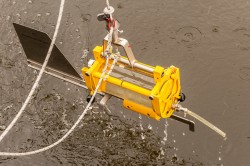Press Release, 09. April 2020
How good is water quality across the globe?
UFZ coordinates networked project GlobeWQ to analyse water quality worldwide
An adequate supply of high-quality freshwater is essential to both people and nature. However, surface water and groundwater all over the world are under tremendous pressure. For example, according to estimates by the Helmholtz Centre for Environmental Research (UFZ), water quality in most rivers in Latin America, Africa and Asia has deteriorated since the 1990s. Recently an international research project got underway at the UFZ to record water quality measurements more reliably.
Around four billion people worldwide experience acute water scarcity for at least one month out of the year. But it's not just the amount of water that's a problem - almost everywhere in the world, including Germany, water quality is in need of improvement. This is one reason why the United Nations identified the preservation and improvement of water quality as one of 17 Sustainable Development Goals (SDGs). Goal 6, Clean Water and Sanitation, aims to reduce the proportion of untreated industrial and domestic wastewater and to increase the protection of water-related ecosystems such as lakes, rivers and wetlands. This can only be achieved with the help of reliable, globally available data on the status of water bodies and an understanding of the most important factors influencing this status. This is the starting point for the project Global Water Quality Analysis and Service Platform (GlobeWQ), which is being funded by the German Federal Ministry of Education and Research (BMBF) until September 2022. "Obviously there are already databases of measurements, but because not all countries have regular environmental measurement programmes, the available data is often patchy, out of date or incompatible," says UFZ hydrobiologist Prof Dietrich Borchardt, who is leading the project. For this reason, he explains, it is not possible to form a sufficiently accurate picture of global water quality from measurement data alone. As a result, critical statuses often go unrecognised and therefore cannot be addressed.
In addition to the UFZ, the members of the consortium include Ruhr-Universität Bochum, the United Nations Environment Programme (UNEP), the International Centre for Water Resources and Global Change (ICWRGC) and the companies terrestris and EOMAP. The partners now intend to link in-situ measurements with information from images captured by the Sentinel-2 satellites and model-based estimates of water quality. "GlobeWQ will deliver the prototype of an analysis and service platform, which uses a globally standardised methodology to make water quality information that is relevant to decision-making available at the regional level," says Dietrich Borchardt. Before the prototype goes into practical use, it will be tested on lakes, rivers and groundwater bodies around the world in ten case studies. In Germany, for example, it will be trialled in the catchment area of the Elbe and on Lake Constance. If the test phase is successful, this could allow the quality of surface water and groundwater to be evaluated more accurately and threats to water quality to be identified and addressed more quickly.
The research project GlobeWQ is part of the BMBF framework programme Research for Sustainable Development (FONA3) and is associated with the BMBF funding measure Water as a Global Resource (GRoW). The project consortium consists of the UFZ, the United Nations Environment Programme (UNEP), Ruhr-Universität Bochum, the International Centre for Water Resources and Global Change (ICWRGC) and the companies Earth Observation & Environmental Services (EOMAP) and terrestris GmbH & Co. Germany's Federal Environment Agency (UBA) and the European Environment Agency (EEA) support the project as strategic partners where it touches upon management practices.
More information on the project: http://www.globe-wq.info
Further information
Prof. Dr. Dietrich Borchardt
Head of Department of Aquatic Ecosystem Analysis and Management / UFZ GlobeWQ Project Manager
dietrich.borchardt@ufz.de
Dr. Christian Schmidt
GlobeWQ Project Coordinator
christian.schmidt@ufz.de
UFZ press office
Susanne Hufe
Phone: +49 341 6025-1630
presse@ufz.de
In the Helmholtz Centre for Environmental Research (UFZ), scientists conduct research into the causes and consequences of far-reaching environmental changes. Their areas of study cover water resources, ecosystems of the future, environmental technologies and biotechnologies, the effects of chemicals in the environment, modelling and social-scientific issues. The UFZ employs more than 1,100 staff at its sites in Leipzig, Halle and Magdeburg. It is funded by the Federal Government, Saxony and Saxony-Anhalt.
www.ufz.deThe Helmholtz Association contributes to solving major challenges facing society, science and the economy with top scientific achievements in six research fields: Energy; Earth and Environment; Health; Key Technologies; Matter; and Aeronautics, Space and Transport. With some 39,000 employees in 19 research centres, the Helmholtz Association is Germany’s largest scientific organisation.
www.helmholtz.de
